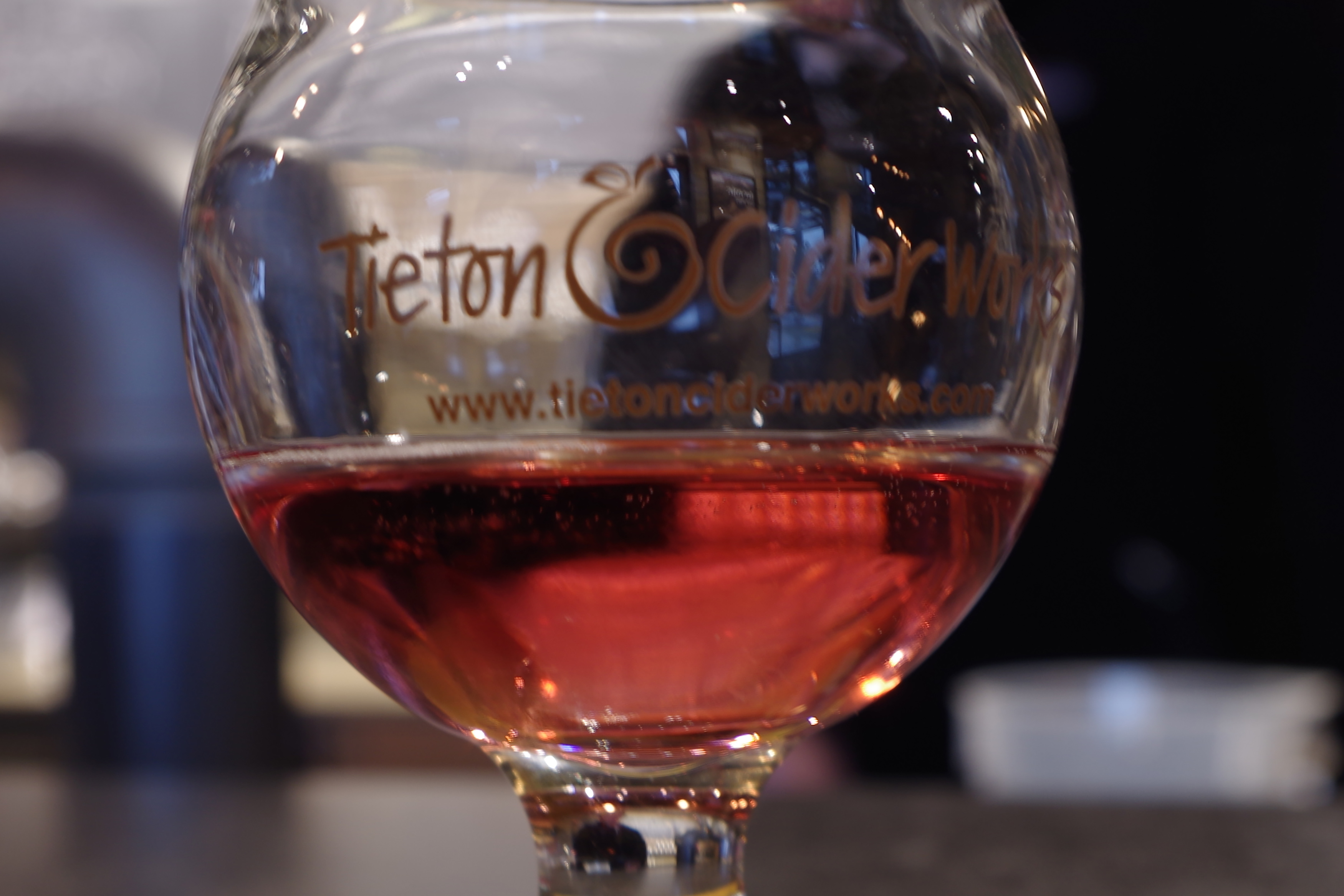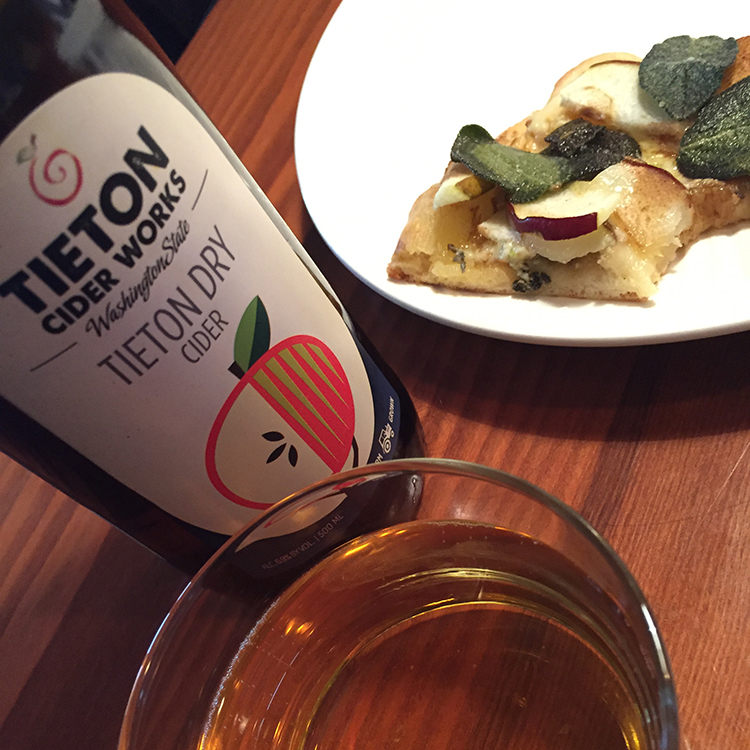Snakebite and black. That was the first eye opening experience I had with cider. My Irish friend was living in Edinburgh, Scotland, and visiting her there for several weeks in the mid-1990s, she turned me on to her favorite drink—a snakebite and black. Essentially half lager, half cider, with a hit of blackcurrant cordial, it was definitely the drink of choice for us barely 20-something-bar-going-hipsters of the day. Much of the cider there was on draft just like the beer. Everywhere! In the end, what came out of it was a soft spot in my heart for hard cider. On returning to the United States, there was no cider to be found. When it did start popping up in the market place years later, it was terribly sweet. While the combination of apples and sweet doesn’t seem abnormal, a really beautiful hard cider is actually dry and complex—that lovely apple flavor is there, but without the sugar blast. Several years ago, Tieton Cider Works bottles began popping up here in the Yakima Valley, and to my delight, that dry and complex flavor profile was present.
Being apple season, we at rooted have manzanas on our mind. Knowing that we are the top apple growing region in a state that grows the most apples in the country, you would think making hard apple cider wouldn’t be unique. But it is. There is only one cidery here, and it is a fairly young company. Tieton Cider Works (TCW) started up in 2008. Owners Craig and Sharon Campbell had been growing apples in Tieton in an orchard that has been in their family for nearly 100 years when they became intrigued with cider apples. Now, cider apples are a different animal entirely than their supermarket siblings. They’re like the more cerebral older sister that doesn’t wear makeup. Not something you would ever snack on, but the higher tannins and varying acid levels make a sublime and elegant cider. Because these varieties are not widely available, many of the giant cider companies use conventional apple concentrates in their cider, which is why they are sweeter and lack depth. But being that they are in the Yakima Valley, the Campbells are able to grow their own cider apples in their own apple orchard, Harmony Orchards, so that TCW can source itself, from the earth to the bottle.
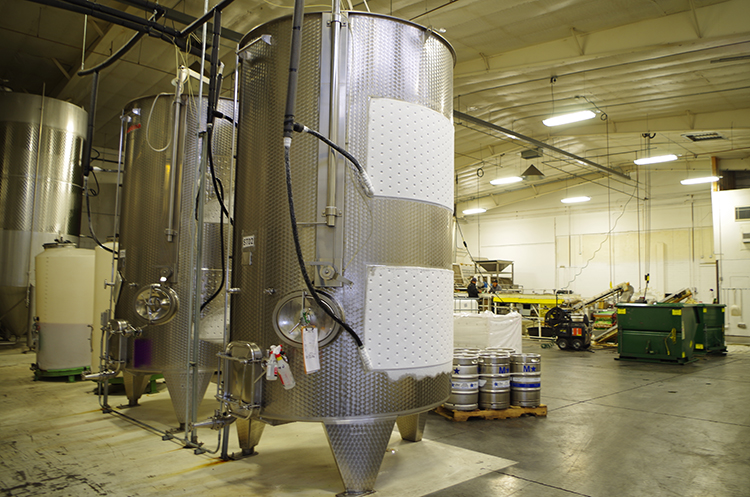 Aileen and I decided to visit Tieton Cider Works while they were pressing juice. Meeting up with Operations Manager Marcus Robert on a recent rainy morning, we walked into the clean, open space of their production area. The press was already operating when we arrived.
Aileen and I decided to visit Tieton Cider Works while they were pressing juice. Meeting up with Operations Manager Marcus Robert on a recent rainy morning, we walked into the clean, open space of their production area. The press was already operating when we arrived. 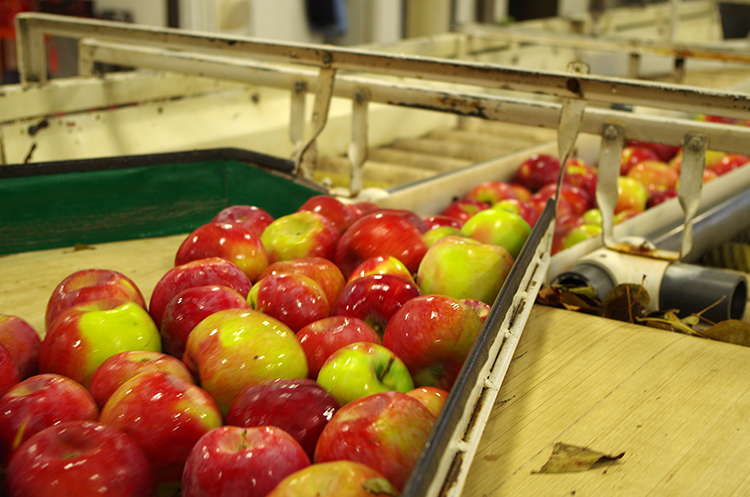 Noisy and efficient, it can press 300 gallons an hour. Today is was Cortlands, an heirloom variety less uncommon on the east coast, that were being custom pressed for another cider company. The apples are guided through to a tension belt where they are pressed flat, releasing all their juice which is diverted into a collection barrel.
Noisy and efficient, it can press 300 gallons an hour. Today is was Cortlands, an heirloom variety less uncommon on the east coast, that were being custom pressed for another cider company. The apples are guided through to a tension belt where they are pressed flat, releasing all their juice which is diverted into a collection barrel. 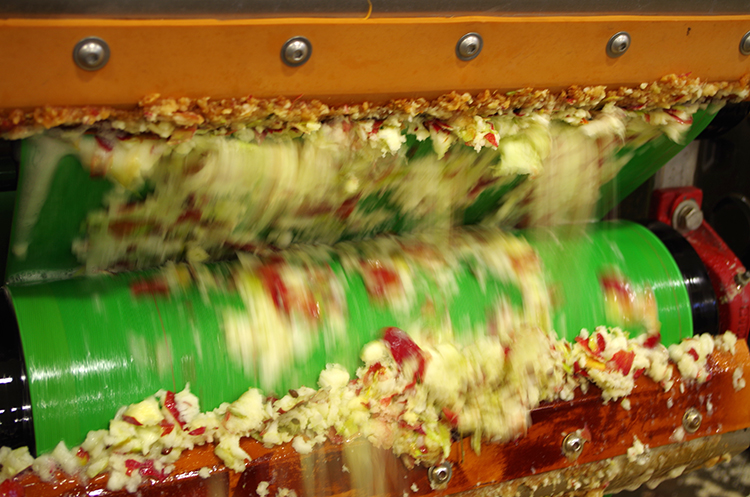
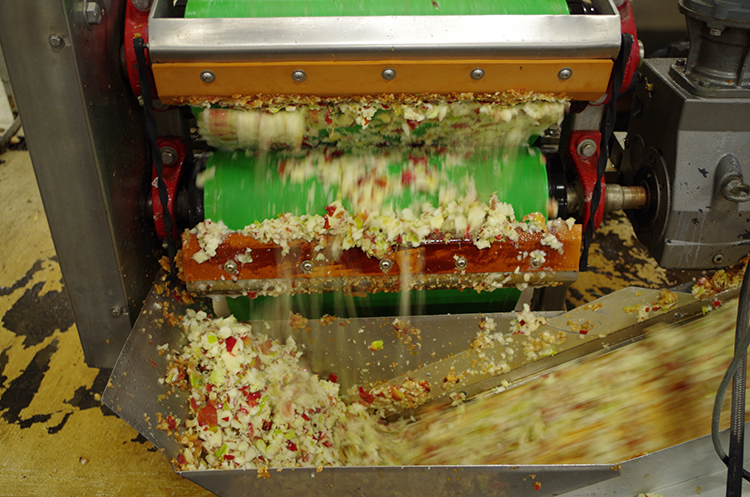
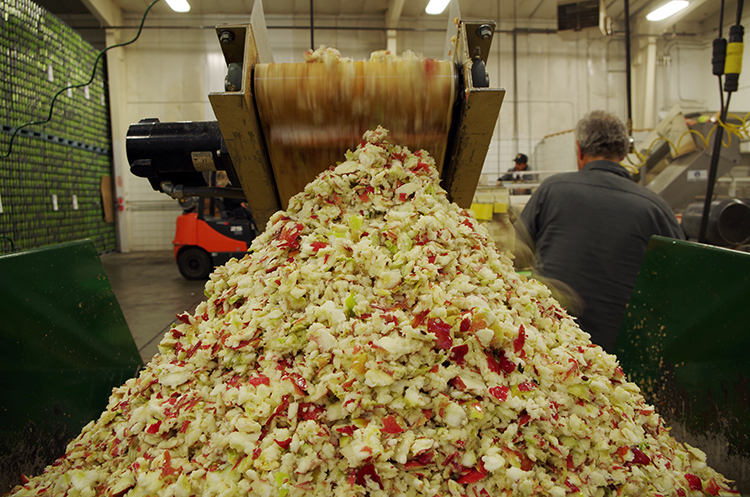 The solids leftover are known as pomace, and are sent off as good eats to a cattle farm. Storage allows them to press apples and produce cider year round.
The solids leftover are known as pomace, and are sent off as good eats to a cattle farm. Storage allows them to press apples and produce cider year round.
Being that Cortlands are uncommon, we got into a long dialog about apple varieties, and the bittersharp and bittersweet types that make a good cider. Marcus told us that cider was a working class drink before the German influence brought more beer to our shores. The Temperance Movement of the mid 1800s swayed folks against the alcoholic apple, as it was used by Eve to tempt Adam, and, as Marcus explained, owning a cider orchard all of a sudden put you on the bullet train to hell. Whole orchards and the old world varieties they supported were decimated. Then the German immigrants started to arrive with their lager recipes, making beer popular, and what was left of cider apples after that was pretty much wiped out by prohibition. We were surprised to learn that the oldest existing cidery in the U.S. was started in 1991.
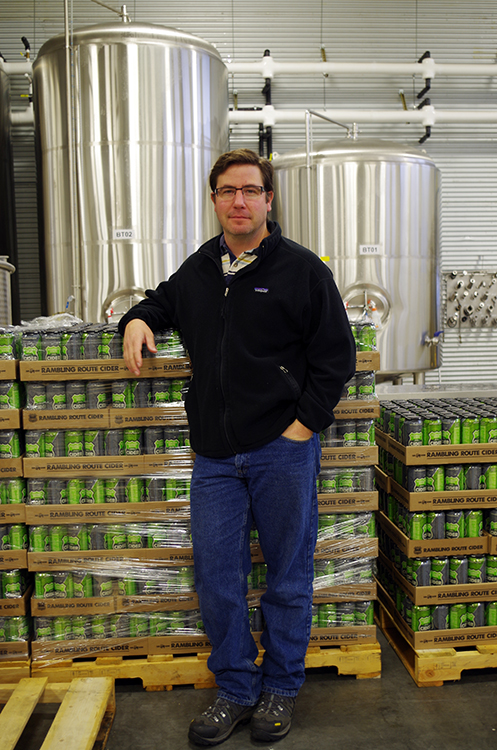 Cider is currently in a resurgence. People are loving the depth, structure and complexity that can be found in a thoughtfully crafted hard cider. Lower calories, gluten free, with less sugar than wine but still with layers and flavor, its light to medium body pairs well with a lot of different foods. TCW has 14 different products sold in 14 states and has won numerous awards for all of their products.
Cider is currently in a resurgence. People are loving the depth, structure and complexity that can be found in a thoughtfully crafted hard cider. Lower calories, gluten free, with less sugar than wine but still with layers and flavor, its light to medium body pairs well with a lot of different foods. TCW has 14 different products sold in 14 states and has won numerous awards for all of their products. 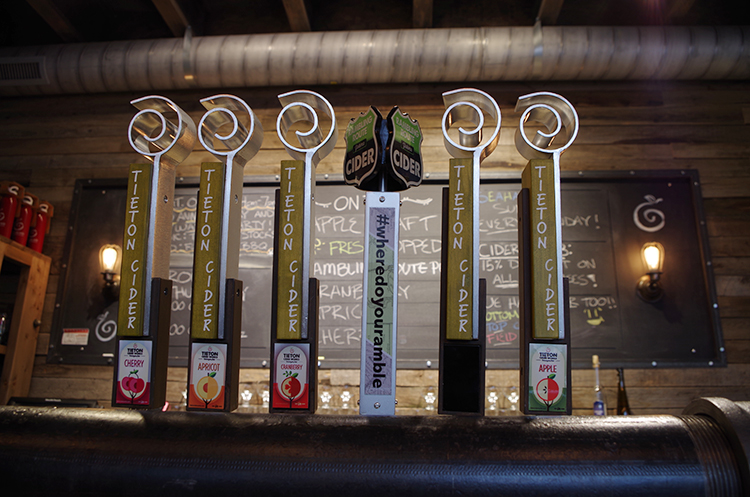 About two years ago they opened a beautiful tasting room in Yakima adjoining their production facility that was designed to resemble an old apple warehouse. Complete with appetizers, a great outdoor space with bocce courts (and a bocce league!) live music in the warmer months, and meeting rooms, there is some fun to be had there.
About two years ago they opened a beautiful tasting room in Yakima adjoining their production facility that was designed to resemble an old apple warehouse. Complete with appetizers, a great outdoor space with bocce courts (and a bocce league!) live music in the warmer months, and meeting rooms, there is some fun to be had there. 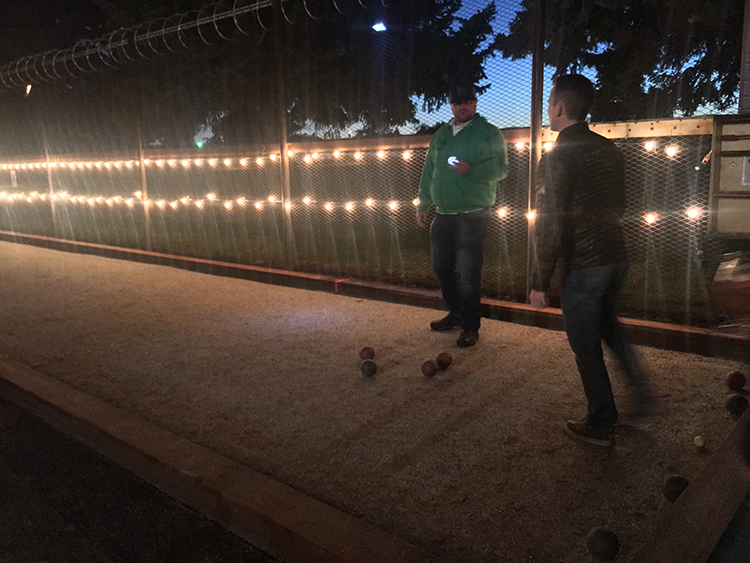 We ended our tour in the tasting room with Marcus pouring us a few samples. Their best seller, the Apricot Cider was a standout—tart, fruity yet dry. The Cranberry with its hint of cinnamon tasted like the Holidays, and the Apple was everything I love about cider—dry and complex with that lovely apple flavor.
We ended our tour in the tasting room with Marcus pouring us a few samples. Their best seller, the Apricot Cider was a standout—tart, fruity yet dry. The Cranberry with its hint of cinnamon tasted like the Holidays, and the Apple was everything I love about cider—dry and complex with that lovely apple flavor.
